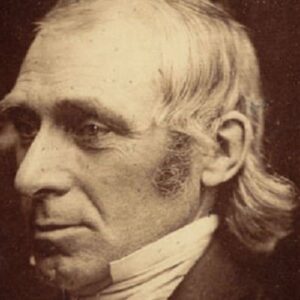Amos Bronson Alcott was an American educator, author, and one of the century’s most esteemed transcendentalists. He is best renowned for his work as a teacher, where he advocated and implemented a new kind of teaching that rejected harsh manners and corporal punishment in favor of a loving and constructive environment. He was self-educated for a significant portion of his lengthy life and felt that education should promote the child’s cerebral, moral, spiritual, and physical development. However, his theories were regarded with skepticism, and he was labeled an eccentric professor incapable of imparting relevant information to his students. Later in life, he published his experiences in numerous of his novels and created a number of more works. He was a vegan who felt that utopia could be attained on Earth and even founded a commune to realize his goals. His family remained impoverished until his daughter Louisa May Alcott became a world-renowned author. During his lifetime, he pioneered a kinder approach to education based on mutual respect and familiarity, and he supported a number of movements, including veganism and abolitionism. He was a visionary with a brilliant mind who dedicated his life to the advancement of society while confronting severe societal problems.
Youth and Early Life
29 November 1799, in Wolcott, Connecticut, he was born to Joseph Chatfield Alcott, an ignorant farmer, and Anna Bronson Alcott, his wife. He was the eldest of eight children in his family.
His small rural community had only a one-room schoolhouse that taught reading and writing fundamentals. He left school when he was 10 years old.
Reverend Tillotson Bronson offered to teach and prepare him for college when he was 13 years old, but he left his uncle’s home after one month and relied on self-education thereafter.
Amos Alcott’s Career
At the age of 15, he began working for a well-known clockmaker. At the age of 17, he obtained his teaching certificate but, unable to find suitable employment, became a traveling salesman in the southern United States.
The cash he earned as a peddler was modest, but he began to worry about its impact on his spirit. Indebted, he returned to Connecticut in 1823 and, with the assistance of his uncle Tillotson, secured a teaching position.
He swiftly adopted a new method of instruction and refurbished the school for the convenience of his students. His unconventional techniques were met with skepticism, and he relocated to numerous locations, including Bristol, Boston, and Germantown, in an attempt to find a more sympathetic society, but was unsuccessful.
In 1834, he started a school in Boston with 30 primarily affluent students. Parents withdrew their children from the school as a result of his unique teaching methods and quirky religious beliefs, which he conveyed to his kids.
His record of failures culminated when he allowed an African American kid to his later “parlor school” against the parents’ concerns and refused to remove him.
Later, he founded Fruitlands, a utopian community, with the assistance of his friend Charles Lane. However, it finally failed and was closed due to the poor quality of its soil, food shortages, and resulting unrest among its inhabitants.
In 1844, in a cloud of controversy, his family relocated to Concord, Massachusetts. His daughter Louisa May Alcott began writing seriously in Concord. She became a renowned author and restored the family’s financial stability later in life.
With the improvement of his financial situation, he further developed his philosophical beliefs and emerged as a leader of the Transcendentalist movement.
In his old age, he authored various philosophical writings and memoirs, but they were believed to pale in comparison to his conversational skills.
Amos’s Major Opera
Even before the phrase was defined, he was one of the earliest and most notable vegans. He argued that eating was the key to human perfection and established a connection between physical and mental improvement.
In 1834, he founded Temple School, the first “progressive school” in America. He eschewed conventional punishment for students and advocated a humanistic approach to their education. His teaching approach and views on race and women’s rights would be extensively embraced in the future.
Personal History and Legacy
On May 22, 1830, he married Abby May, sister of American reformer Samuel Joseph May, against his family’s wishes. Joseph presided over their wedding at King’s Chapel.
They had four daughters: Anna Bronson Alcott in 1831, Louisa May Alcott in 1832, Elizabeth Sewall Alcott in 1835, and May Alcott in 1831. (1840). In 1839, their lone son was born, although he only lived for a few minutes.
Elizabeth May Alcott, his daughter, died at the age of 22 from scarlet fever in 1858. May Alcott, his youngest daughter, and a renowned artist, passed away in 1879 shortly after giving birth to her daughter.
His most famous daughter was the famed author Louisa May Alcott, who is still widely read today. She is well known for her critically praised novel, ‘Little Women,’ which was inspired by their time at Orchard House, Concord.
His wife passed away in Concord on November 25, 1877. He never returned to Orchard House after her death because he was too heartbroken to live there.
He passed away in Boston, Massachusetts on March 4, 1888, at the age of 88. Louisa May arrived just two days later.
Estimated Net Worth
Amos is one of the wealthiest and most well-known teachers. According to our investigation, Wikipedia, Forbes, and Business Insider, Amos Bronson Alcott has an estimated net worth of $1.5 million.


